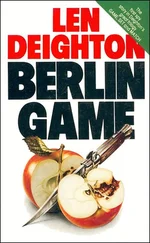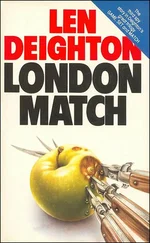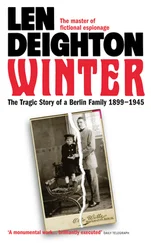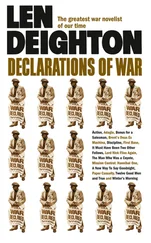Len Deighton - XPD
Здесь есть возможность читать онлайн «Len Deighton - XPD» — ознакомительный отрывок электронной книги совершенно бесплатно, а после прочтения отрывка купить полную версию. В некоторых случаях можно слушать аудио, скачать через торрент в формате fb2 и присутствует краткое содержание. Жанр: Триллер, на английском языке. Описание произведения, (предисловие) а так же отзывы посетителей доступны на портале библиотеки ЛибКат.
- Название:XPD
- Автор:
- Жанр:
- Год:неизвестен
- ISBN:нет данных
- Рейтинг книги:4 / 5. Голосов: 1
-
Избранное:Добавить в избранное
- Отзывы:
-
Ваша оценка:
- 80
- 1
- 2
- 3
- 4
- 5
XPD: краткое содержание, описание и аннотация
Предлагаем к чтению аннотацию, описание, краткое содержание или предисловие (зависит от того, что написал сам автор книги «XPD»). Если вы не нашли необходимую информацию о книге — напишите в комментариях, мы постараемся отыскать её.
XPD — читать онлайн ознакомительный отрывок
Ниже представлен текст книги, разбитый по страницам. Система сохранения места последней прочитанной страницы, позволяет с удобством читать онлайн бесплатно книгу «XPD», без необходимости каждый раз заново искать на чём Вы остановились. Поставьте закладку, и сможете в любой момент перейти на страницу, на которой закончили чтение.
Интервал:
Закладка:
Stuart returned to his Aston Martin. There was no sense in going back there. Even now there would be police cars and ambulances on the way. Furthermore, the standing instructions gave a strong warning against field employees becoming involved in police inquiries of any kind. The Secret Intelligence Service got no pleasure from sending high-ranking department officials across to the Home Office, cap in hand. In spite of all this, he turned his Aston in the car park of the Red Fox and went back.
The clock, thought Stuart. Perhaps the man who had come to mend the chimes had not been installing new ones. Perhaps he had planted explosive in the long case. It was that part of the house which had suffered most. But who had phoned Wever, and was it a warning?
The kitchen was the scene of the greatest damage. Only a close scrutiny by explosives experts would reveal whether the bomb had been placed in the clock, and they would have to search a long time to piece it together. The smell was almost overwhelming. He spat the soot from his mouth.
Wever must have been standing near the stove. There were hardly any signs of damage on his face or his clothes but he was bundled up like a rag doll in a toy box, and was unmistakably dead. Stuart went through his pockets but there was nothing there that one would not expect to find on a hard-working chicken farmer who was too old to cope with the work demanded of him and had cash problems that required him to put aside the payments on a second-hand rotovator.
So that was the man who had brushed shoulders with Hitler. Well, there were worse fates than ending up on an East Anglian chicken farm. There was no sign of Wever’s wife. He stepped carefully over the wreckage of wood splinters and broken glass to get to what had once been a bedroom. There was a cot in the corner. He picked up the woollen blankets. There was no sign of a baby.
The rain was still coming down steadily, soaking into the broken furniture, hissing upon the hot stove and dampening down the dust of the broken plaster. He turned back towards his car, glass cracking underfoot. It was as he stepped over the broken wall of the bedroom that he saw it. The rain had made the metal box shine and he stooped down to inspect the object more closely.
It was an expensive wall safe, built right into the brickwork of the bedroom, in a wall added to the house by the enterprising handyman, Franz Wever. The front of the safe was intact and its door firmly locked. It was the back of the safe that had sprung open with the collapse of the wall. He prised the metal back as if it had been the bent lid of a half-opened sardine can. His hand went into the gap and he found some bundles of papers.
There was an insurance policy, some letters from the local planning office giving permission for building new chicken houses. There were Wever’s permits and a West German passport stamped only twice for visits to Berlin. He had lied about never going back-what other lies had he told?
With this bundle there was another one, wrapped in the black plastic from which fertilizer bags are made, held tight with two rubber bands. Stuart snapped the fastenings off and unwrapped the packet. There was Wever’s old German army pay book, some souvenirs of foreign paper money dating from the war, and a medical form dated September 18, 1944, certifying him fit for infantry duties. Nothing of importance, thought Stuart, and looked at his watch. The police would surely be here any moment. There were houses and farms nearer than the Red Fox, and even there the sound had come like a thunderclap.
It was as he was about to rewrap the pay book that he saw the envelope tucked in amongst the ancient paper money. He ripped the flap open. There it was- Führerkopie , a page from one of the Lagebesprechungen , Hitler’s daily military conferences, with the names of Jodl, Göring and Hitler down the left-hand side. A script of some demented screenplay which played to packed audiences for six long nightmare years. So it had not been Breslow who was so obsessed by the contents of the tin boxes that he had to steal a souvenir, but Wever himself, the arch cynic to whom Hitler meant nothing.
There were other things too: a GPO receipt for a registered letter addressed to ‘General Delivery, Terminal Annex, Post Office, Los Angeles, California 90054 ’, dated almost one week earlier; a battered Reich Chancellery pass, stamped each month and signed up to the end of 1944. It was a good souvenir. There was a sepia, postcard-size photo, taken in some provincial studio by the look of it, the photographer’s name and an Austrian address in flamboyant script on the back. A young child posed stiffly in front of a painted backdrop of snow-covered mountains. One could almost hear the anxious father calling to the child to hold still.
The other photo was unmistakably amateur: a grubby snapshot from a cheap camera, the print now cracked and dog-eared. Three men were standing self-consciously in what looked like a factory yard. Behind them posts or perhaps factory chimneys and, beyond those, low rolling hills. The reproduction was too grainy to see any detail but one jackbooted young man in leather overcoat and mountain cap looked like Max Breslow. Alongside him, Wever stood in an awkward jokey pose, his elbow resting on Breslow’s shoulder, the other hand on his gun holster which was worn over a mottled camouflage jacket. The third man was in civilian clothes: a long black overcoat and, in his hand, a wide-brimmed felt hat. On the back of the photo ‘Max’, ‘Franz’ and ‘Rb. Dir. Dr Frank’ were written in pencil.
Stuart put the passes, the Führerkopie of the sheet of minutes and the photographs into his pocket before putting the rest of it back into the broken safe. Then he clambered over the debris and ran back to his car. Even before he started the engine, he could hear the wail of the police and ambulance sirens. By the time his car was at the main road he could see the flashing blue lights twinkling through the haze of rain as the police cars bumped along the track that marked the end of Wever’s few acres.
14
‘And all this happened yesterday evening?’ said Sir Sydney Ryden. They were in the SIS Ziggurat building. The Prime Minister’s visit to Tokyo had provided him with a respite from her continual questions. The DG had hardly moved from a position alongside his desk while Boyd Stuart had been telling him about the visit to Franz Wever. It was disconcerting to talk to a man who stood with his eyes lowered to his drink and his feet planted firmly apart, scarcely moving except when he occasionally raised a hand to flick back his long hair or touch his ear.
‘That’s right, Sir Sydney,’ He glanced at the newspapers scattered on the armchair. It had been too late for the morning papers-except for some of the late London editions-to use the story, but the evening papers were all giving it the front page. ‘IRA Bomb Factory Blast-Man Dies’ ‘Bomb Squad Arrests in London Follow Explosion at Farmhouse.’
‘There were no arrests by the Bomb Squad,’ said Sir Sydney.
‘I guess it is just the newspapers’ way of linking the explosion to terrorism. It sells more newspapers, I suppose.’
‘Don’t be too hard on Fleet Street, Stuart. We have some good friends there.’
Stuart looked up sharply. So that was it. It was the DG’s doing; the cunning old devil had manufactured the terrorist story to put everyone off the scent.
‘Better that way,’ said the DG. ‘And, with Wever being a rather taciturn German, his neighbours out there in Suffolk were only too ready to invent all kinds of evil doings.’
‘ Norfolk actually, sir,’ said Stuart. ‘He said he worked for us.’
The DG pursed his lips in distaste. ‘For one of the departments in Whitehall,’ he said icily. The correction left Stuart in little doubt that Wever was some sort of employee of MI5, an organization for which Sir Sydney showed little admiration. ‘And you found a photo of this fellow Max Breslow in the ruins of his farmhouse?’
Читать дальшеИнтервал:
Закладка:
Похожие книги на «XPD»
Представляем Вашему вниманию похожие книги на «XPD» списком для выбора. Мы отобрали схожую по названию и смыслу литературу в надежде предоставить читателям больше вариантов отыскать новые, интересные, ещё непрочитанные произведения.
Обсуждение, отзывы о книге «XPD» и просто собственные мнения читателей. Оставьте ваши комментарии, напишите, что Вы думаете о произведении, его смысле или главных героях. Укажите что конкретно понравилось, а что нет, и почему Вы так считаете.












